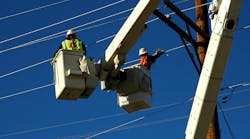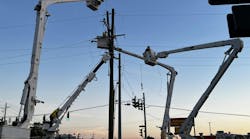Lately, a lot of news has swirled around linemen being recognized as first responders. By gaining this designation, linemen would be placed into the same category as law enforcement and emergency medical services. Before we go down that road, however, we must first decide how the industry can standardize the minimum qualifications for an individual to be classified as a Qualified Electrical Worker.
Currently, tens of thousands of individuals are performing work as electrical line repairers and installers with a huge disparity in their education, training and experience, yet they still label themselves as “linemen.” Unfortunately, without a nationally recognized standard, there is no way to systematically train, educate and hire qualified, certified, and professional electrical workers.
The largest organization with some standardization is the International Brotherhood of Electrical Workers (IBEW). The IBEW provides apprenticeship opportunities, training, and staffing services. The union has a developed apprenticeship program for various trades from high-voltage to low-voltage electrical workers, tracking apprentices and assigning them to different contractors to provide a variety of on-the-job training. Utilities typically have their own internal apprenticeship programs that typically mirror the union criteria, however, utilities have greater opportunities for employee development within their organizations.
Hiring Qualified Workers
What happens after the lineworker becomes a journeyman? No national regulatory body certifies/qualifies linemen. I have been involved in hiring and training apprentices and journeymen since 1988. I have developed and delivered oral hiring interviews, written journeymen tests and skills testing evaluations while working at a utility. I have had candidates who did well on the oral interview and perform miserably during skills evaluations and vice versa.
The question remains, “What is a journey-level line worker?” Where do you find this job description? If a company is hiring, then a section in the job application will describe the “essential job functions.” Depending upon the department, however, there can be different types of skills sets required. Some organizations are large enough to have separate overhead transmission and distribution departments, municipal network, substation electricians and electrical technicians, troubleshooters, and cable splicers. Some companies have overlapping job functions.
In my career, I worked on a variety of projects: transmission, distribution, wire stringing operations, underground cable pulling, terminations and splices, meters/services, capital projects and asset maintenance, etc. I left the utility and ventured out into the world of contracting and training. Suddenly I was tasked with operating more heavy equipment, backhoes, and cranes, etc. I was the project manager on jobs and was responsible for wire stringing operations, installing all of the overhead infrastructure, building the substation, ensuring the right mix of concrete for the switchgear, etc. This was beyond the scope of my training as a lineman.
A great learning experience and the biggest obstacle to overcome was hiring qualified electrical workers. With nothing but a resume and an oral interview, I had minimal background information to determine how to hire the best people. This is a huge challenge financially and legally from an employer perspective. I had to terminate a number of individuals because they just didn’t have the skills to perform work as a qualified electrical worker.
Developing Consistent Criteria
In my opinion, qualified electrical workers need to be held to the highest standards in the industry. Nurses, doctors, lawyers and engineers have to meet rigorous standards to maintain their professional licenses, why shouldn’t electrical workers? The average lineworker apprenticeship program is between three to four years. It is then it is up to the employer to promote the individual to journey-level status. After the individual is promoted to a journeyman, a worker typically has no other continuing education or recertifications for the rest of his or her career. Other than the organization providing annual refresher training for regulatory compliance, lineworkers can go through their entire careers without any additional training to enhance or maintain their skill sets.
By developing consistent and standardized criteria with rigorous testing and recertifications, our industry will see a reduction in injuries, lost time, increased productivity and quality of output. As of May 2019, the United States had 111,660 electrical power line installers and repairers, according to the U.S. Bureau of Labor and Statistics. These workers are tasked with installing, maintaining, and troubleshooting the most valuable commodity in a first-world country: safe and reliable electric service. That means that .00031% of the population is maintaining our electric power grid. Additionally, retirements are at an all-time high, which means hundreds of years of experience is leaving the workforce. We need to ensure that we capture that information and pass it on to the next generation of workers.
Maximo Fuentes ([email protected]) retired as the Grid Assets T&D Line Supervisor-Business Operations for the Sacramento Municipal Utility District in Sacramento, California. He now owns a consulting business, Grid Resources, a company that provides technical consulting, leadership development and expert witness services to the Transmission and Distribution Utility Industry (www.gridresources.net). Fuentes is also a general business partner for West Coast Utility Solutions – North and a member of the Transmission Distribution Maintenance Management Association.


